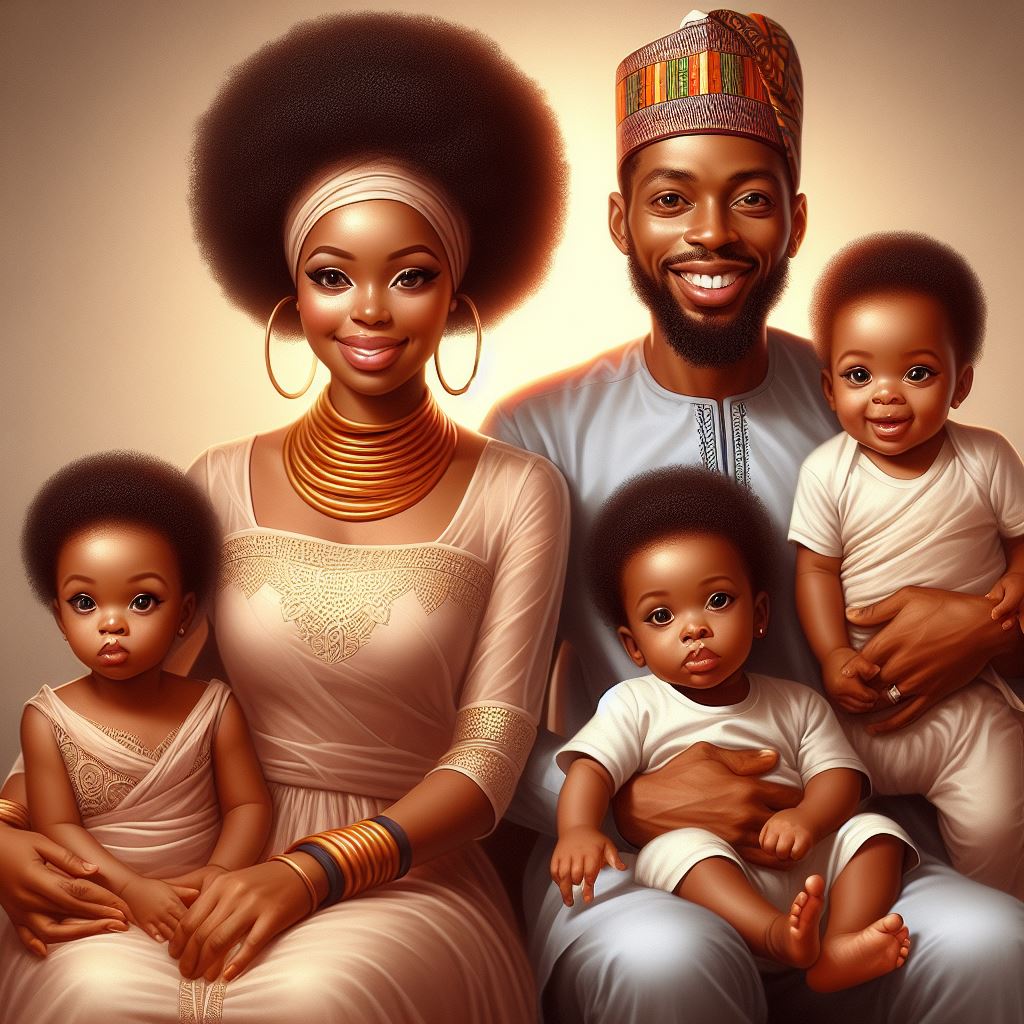Introduction
Nigerian parenting reflects cultural nuances, emphasizing respect, discipline, and communal responsibility.
Recognizing these challenges is crucial for fostering equitable, empowered, and progressive societies.
Gender-specific issues profoundly impact children’s development and future prospects.
Understanding Nigerian parenting involves delving into a rich tapestry of traditions, beliefs, and values that influence child-rearing practices in this diverse nation.
Addressing gender-specific challenges within Nigerian parenting unveils critical disparities affecting boys and girls differently.
These challenges encompass societal expectations, where boys may face pressure to conform to traditional masculine norms, stifling emotional expression.
Girls encounter barriers limiting opportunities, reinforcing traditional gender roles and hindering their pursuit of education and career aspirations.
Exploring these challenges helps dismantle stereotypes, fostering an inclusive environment where children can thrive regardless of gender.
By acknowledging these challenges, parents can adopt progressive approaches that empower both boys and girls equally.
Efforts to address gender-specific challenges in Nigerian parenting contribute to societal transformation, fostering a more equitable and just future.
Moreover, understanding and addressing these challenges paves the way for breaking the cycle of gender-based inequalities.
In essence, this exploration aims to spotlight the nuances of Nigerian parenting and the importance of tackling gender-specific challenges to foster a more equitable society.
Gender role expectations in Nigerian society
Gender-specific challenges in Nigerian parenting are deeply rooted in the expectations set by society, where gender roles play a significant role.
These gender expectations influence how parents raise and nurture their children.
Cultural and traditional expectations
1. Gender roles in household chores and responsibilities
In Nigerian society, specific gender roles are assigned when it comes to household chores and responsibilities.
Parenting Made Just for You
Get personalized Parenting Solutions tailored to your child’s needs. Transform your parenting journey with expert guidance in 1-3 days.
Get StartedGirls are often expected to handle domestic tasks, such as cleaning, cooking, and taking care of younger siblings, while boys are encouraged to engage in more physically demanding activities or help with tasks outside the home.
These expectations can sometimes limit the development of skills in children and reinforce gender stereotypes, as girls are not encouraged to explore outdoor activities or boys may not learn essential household skills.
2. Expectations regarding career choices and aspirations
Similarly, Nigerian society places different expectations on career choices and aspirations based on gender.
Boys are generally encouraged to pursue careers in fields like medicine, engineering, or business, which are perceived as more prestigious and financially rewarding.
On the other hand, girls are often steered towards careers in nursing, teaching, or other traditional female-dominated sectors.
These expectations can influence the decisions children make regarding their education and future.
It limits their choices and perpetuates the notion that certain professions are more suitable for one gender over the other, restricting their potential and hindering gender equality.
Read: Celebrating Gender Diversity with Nigerian Children
Influence of religion on gender roles
The role of religious teachings in shaping gender expectations
Religion plays a crucial role in Nigerian society and significantly influences gender expectations.
Religious teachings often emphasize traditional gender roles, reinforcing the idea that men are the breadwinners and women are the caretakers of the family.
These teachings may be interpreted as suggesting that women should prioritize their roles as wives and mothers over personal and professional growth.
Religious practices that reinforce traditional gender norms
Religious practices, such as marriage ceremonies and family rituals, often reinforce traditional gender norms.
For example, in Nigerian weddings, there are specific roles and responsibilities assigned to the bride and groom, reflecting the societal expectations of their future roles within the marriage.
These practices continuously reinforce and perpetuate the gender-specific challenges faced by Nigerian parents in raising their children.
Unveil the Perfect Name that Tells Your Family's Story
Let us help you find a name that embodies your family's values, traditions, and dreams. Our personalized consultation weaves cultural insights to create a name that's uniquely yours.
Get StartedAddressing gender-specific challenges in Nigerian parenting requires a shift in societal norms and expectations.
It is crucial to promote gender equality and provide children with equal opportunities to explore their interests and talents, regardless of their gender.
Parents, educators, and the society as a whole must actively challenge and break the stereotypes that limit the potential of boys and girls, allowing them to flourish in all aspects of life.
Challenges faced by Nigerian parents in relation to gender-specific issues
In Nigerian parenting, both sons and daughters face unique challenges due to gender-specific issues.
Nigerian parents often grapple with these challenges while raising their children.
Sons
Sons face immense pressure to conform to masculine stereotypes. Nigerian society expects them to be strong, brave, and assertive.
Deviating from these expectations can lead to judgment and disappointment.
Navigating the expectations of being the breadwinner is another challenge faced by Nigerian parents raising sons.
Society places a heavy burden on boys and men to provide and financially support their families.
Balancing emotional expression and societal expectations is yet another challenge.
Nigerian boys are often discouraged from showing vulnerability or expressing their emotions freely, which can lead to suppressed feelings and instability in their mental well-being.
Daughters
Nigerian parents raising daughters often face the challenge of limited opportunities for education and career advancement.
Gender inequality in education and the workplace restricts girls’ access to quality education and hinders their professional growth.
Societal pressure to prioritize marriage and motherhood over personal aspirations is a significant challenge for Nigerian parents raising daughters.
The traditional expectation for girls to settle down and start a family can hinder their pursuit of personal goals and dreams.
Addressing body image and beauty standards is another challenge faced by Nigerian parents raising daughters.
Society’s emphasis on beauty ideals often leads to body image issues and low self-esteem among girls, affecting their overall well-being.
In fact, Nigerian parents face various challenges when it comes to gender-specific issues in parenting.
Whether raising sons or daughters, they have to navigate societal expectations and stereotypes, strive for equality and provide the necessary support to help their children overcome these challenges.
It is essential for Nigerian society to address and overcome these gender-related challenges to create a more inclusive and supportive environment for both parents and children.
Read: Breaking Gender Norms: Stories from Nigerian Families
Impact of gender-specific challenges on Nigerian families
Gender-specific challenges in Nigerian parenting have deeply entrenched roots within societal norms.
These norms dictate behavioral expectations based on gender, impacting how emotions are expressed and communicated within families.
These challenges influence several facets of familial dynamics, particularly in communication and emotional bonding, as well as the mental and emotional well-being of children.
Limited Emotional Expression and Family Dynamics
In Nigeria, societal norms often restrict the emotional expression of both boys and girls.
Boys are typically taught to suppress vulnerability and emotions, encouraged to exhibit stoicism and strength.
Conversely, girls may be encouraged to express certain emotions but are often discouraged from exhibiting anger or assertiveness.
These gender-specific norms create a dichotomy in emotional expression within families, hindering the development of genuine connections.
Such limitations in emotional expression profoundly impact family dynamics.
Children, constrained by societal expectations, might struggle to articulate their feelings openly.
This limitation impedes the establishment of deep, meaningful connections between parents and their children.
As a result, communication gaps emerge, making it challenging for parents to understand their children’s emotional needs and perspectives.
Communication and emotional connection
Parents, conditioned by societal norms, find it challenging to foster open lines of communication.
The expectation for boys to remain emotionally restrained and for girls to adhere to certain emotional norms creates barriers in understanding and empathizing with each other.
Consequently, discussions about feelings, emotions, and personal challenges become difficult, leading to misunderstandings and a lack of emotional support within the family unit.
Mental and emotional well-being
Conforming to these societal expectations imposes a significant psychological burden on children.
The pressure to fit into predefined gender roles stifles individuality and authentic self-expression.
This conformity leads to internal conflicts, anxiety, and low self-esteem as children grapple with societal expectations while trying to establish their unique identities.
Over time, these challenges affect the mental and emotional well-being of children, shaping their self-perception and influencing their future relationships and life choices.
Addressing these challenges requires a multi-faceted approach involving societal reevaluation of gender norms, promoting open and honest communication within families, and providing a supportive environment that allows children to express themselves authentically without the constraints of gender stereotypes.
Such measures can lead to healthier family dynamics, positively impacting the emotional well-being and development of Nigerian children.
Read: Choosing Gender-Neutral Toys: Advice for Parents

Strategies for addressing gender-specific challenges in Nigerian parenting
Gender-specific challenges in Nigerian parenting can be effectively addressed by implementing certain strategies.
These strategies aim to promote gender equality at home and educate children about the importance of challenging gender stereotypes.
Promoting gender equality at home
1. Sharing household responsibilities and chores equally
Assigning household tasks to both sons and daughters can help break traditional gender norms.
By involving boys and girls in domestic chores, parents can ensure that no gender feels burdened with specific responsibilities.
This approach teaches children the value of cooperation and equal partnership within a family.
2. Encouraging open conversations about gender roles and expectations
Parents should create a safe and supportive environment where children can openly discuss gender-related topics.
By engaging in conversations about gender roles, parents can challenge stereotypes and help their children understand the importance of equality.
These discussions can also promote empathy and respect towards individuals of different genders.
Education and Awareness
1. Importance of education in empowering children to challenge gender stereotypes
Education plays a crucial role in shaping children’s perspectives and attitudes.
Parents should emphasize the significance of education, not just academically but also in terms of learning about gender equality.
By educating children about the harmful effects of gender stereotypes, parents can empower them to challenge societal norms and strive for equality.
2. Introducing diverse role models and narratives to promote gender equality
Children often look up to role models to shape their beliefs and aspirations.
Parents can expose their children to diverse role models, both male and female, who have broken traditional gender barriers.
This exposure can enable children to imagine a world where gender is not a limitation and promote equality in all aspects of life.
By implementing these strategies, Nigerian parents can take proactive steps to address gender-specific challenges in parenting.
However, it is important to remember that change takes time and effort.
Consistency and persistence in promoting gender equality can help create a more inclusive and progressive society for future generations.
Read: Gender Expectations: Navigating Parenting in Nigeria
Conclusion
Recap of the major points discussed
- Nigerian parenting faces gender-specific challenges that impact the upbringing of children.
- Boys and girls are treated differently, leading to unequal opportunities and expectations.
- Gender stereotyping perpetuates harmful beliefs and limits the potential of children.
- Parents need to be aware of these challenges and their impact on children’s development.
Emphasis on the importance of addressing gender-specific challenges in Nigerian parenting
By addressing these challenges, parents can create a more equitable and inclusive environment for their children.
- Breaking gender stereotypes promotes the freedom of choice and personal development.
- Equal opportunities for education and career prospects result in a more progressive society.
- Gender equality fosters empathy, respect, and healthy relationships among individuals.
Call to action for parents to embrace gender equality and create a supportive environment for their children
Parents must actively challenge traditional norms and roles to raise confident, independent, and well-rounded individuals.
- Encourage open discussions about gender roles and expectations with children.
- Expose them to diverse role models and narratives that defy gender stereotypes.
- Support their interests and talents equally, regardless of their gender.
- Promote empathy, respect, and cooperation between boys and girls from an early age.
Only by collectively addressing gender-specific challenges can Nigerian parenting pave the way for a brighter future.




